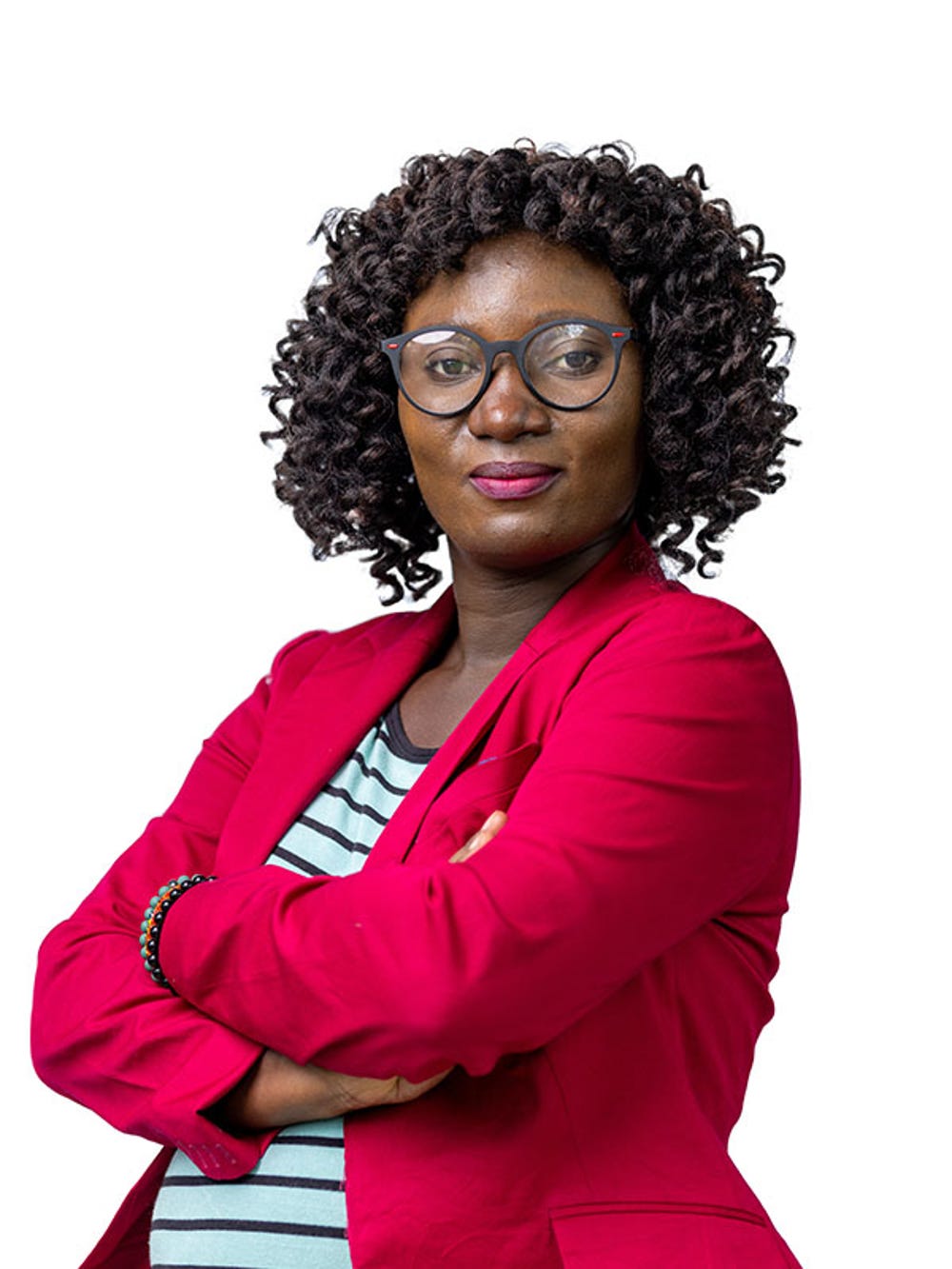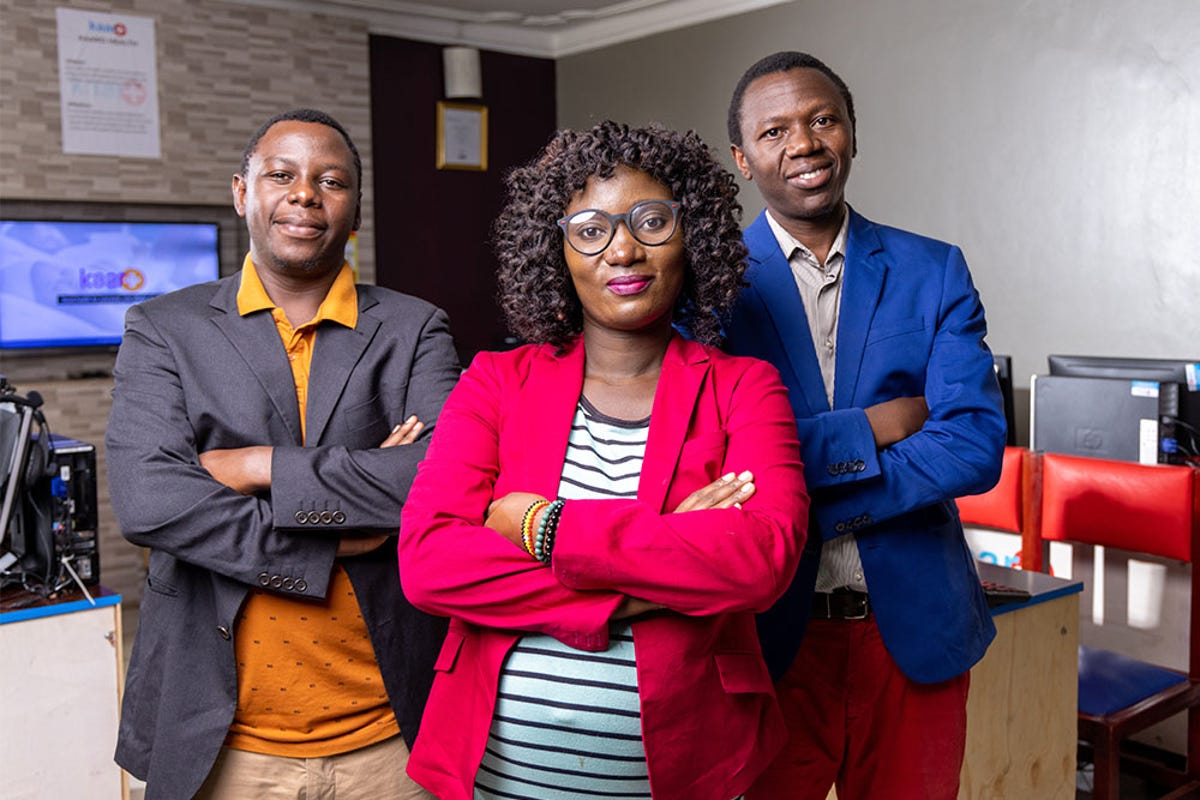Fellow Portrait
Angella Kyomugisha
Kaaro Health

Kaaro Health empowers nurses to set up healthcare businesses in rural Africa and uses technology to bring doctors to hard-to-reach villages.
Anglophone and Lusophone Africa
Uganda
Fellow
2023
Updated March 2023
Poor healthcare access can be deadly in Sub-Saharan Africa
A sign saying “The doctor is in” often hangs on a clinic door to announce that a doctor is available. But too many rural Ugandans can’t get care even if the doctor is in because they must walk as long as a day to the nearest health clinic. This lack of access, which extends through Sub-Saharan Africa, can have deadly consequences. In Uganda, for example, 74 babies and 19 mothers die every day because they can’t receive timely care.
Angella Kyomugisha, a financial management professional, was seven months pregnant in 2014 when her company transferred her from the big city of Kampala to a remote village. Soon after, a life-threatening pregnancy-related emergency required immediate medical attention. “The nearby clinic I was rushed to didn't have a power infrastructure or a basic ultrasound to diagnose the conditions of a pregnant woman,” she says.
She gave birth prematurely. After transferring to the main hospital, mother and baby spent three months fighting for their lives. They survived, but Angella continued thinking about what happened at the clinic. “The nurse didn't have any of the equipment she needed to diagnose me or know what was going on.” The traumatic experience gave her direct knowledge of Uganda’s health inequities and started her on the journey to create Kaaro Health.
She and her colleagues brainstormed about what could support providers like the nurse who helped Angela. They began selling a small package of equipment that included a solar system to ensure electricity access. “We wanted to make sure no other woman or baby would go through what I went through,” Angella says.
My baby and I spent three months fighting for our lives. In short, we survived, but it was really traumatic. I didn't understand what women who live in rural areas go through
.jpg?&quality=80&auto=webp&width=1200)
Self-contained, technology-enabled clinics provide broader healthcare access
The idea evolved into Kaaro’s current offering. These “container clinics” provide everything rural providers need to serve local communities. In addition to solar power, the clinics come with laboratory equipment and an internet connection so they can function as telehealth centers connecting rural communities to city-based doctors. Local nurses manage the clinics and patients pay a small fee to access doctors remotely.
The physical presence of nurses plays a key role in the clinics’ success. Nurses are trusted community members and serve as a bridge to telehealth services, putting patients at ease and providing doctors with more complete information based on a physical exam. “Since it is a community clinic, the patient is comfortable with the nurse,” Angella explains.
Kaaro also empowers nurses to become healthcare entrepreneurs. Nurses can purchase a container clinic financed with monthly payments of about USD$300 over five years. This amount is manageable, since nurses are able to make roughly USD$1,200 to $2,000 a month operating the clinic.
The majority of the doctors are based in urban areas and yet the majority of the population is rural. We need to close this gap. We use technology to connect doctors in the urban centers to rural areas so they can do remote consultations by video.
.jpg?&quality=80&auto=webp&width=1200)
When the doctor is in, healthcare becomes a reality
Since 2017, Kaaro Health has grown to more than USD$800,000 in revenue. The 76 container clinics average about 22 walk-in visits a day, of which five to seven require consultation with a doctor.
“What gets me most excited is seeing people happy and healthy. And that drives me to lead Kaaro Health to keep innovating, because good health doesn't have a substitute,” Angella says. Her vision is to bring high-quality primary healthcare to within one kilometer of every rural and hard-to-reach village across Africa, starting with Uganda.
When that happens, “the doctor is in” will no longer be an empty phrase for millions of African citizens.
Women can walk for only a few kilometers to come for a checkup or get an ultrasound. They can identify the problems so you limit the chances of watching the women dying. The access we bring is saving lots and lots of lives.
.jpg?&quality=80&auto=webp&width=1200)
.jpg?&quality=80&auto=webp&width=1200)

.jpg?&quality=80&auto=webp&width=1200)